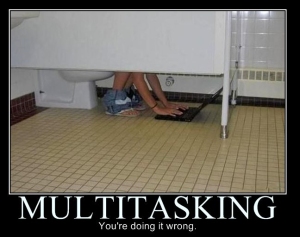A previous postdoc of mine just asked me to post a blog article on how I manage my time. I chose to think that this was meant to be for an advice, rather than for things to avoid. So there it is: how do I do everything I do in research, while also spending considerable amount of time having a family, running long-distance and playing World of Warcraft, all four of which being notoriously time-consuming.
Researchers are now expected to spend time for (and be good at) a large number of various tasks, often requiring totally different skills, including doing research, writing articles about it (well, and a lot), speaking at scientific congresses but also for at public conferences, popularizing in various formats (written, interviews, etc), networking with colleagues, communicating with journalists and stakeholders, finding, securing and managing grants, acting as an editorial member and a reviewer for several scientific journals, evaluating colleagues, students and grants in juries and committees, teaching various classes, supervising internships, mentoring graduate students and directing postdocs (which is quite different), and sometimes heading a group of research. And if time allows, going to pee every other day.

So how do I fit all this into my days? Come to think of it, I don’t have a carefully designed strategy, but over the years I have naturally developed a way of working that allows me to cram in quite a lot. Here are a few things that I do that help me manage.
First of all, I manage my tasks; I set up priorities. Everyday I have a list of things I have to finish by the end of the day, and while being realistic (otherwise it’s useless), I try to have an ambitious list, and to finish it every day (otherwise it’s useless). So I put in this lists the urgent tasks, those that can’t be further pushed away, plus the important ones that still can fit.
Then, I play Tetris with my priorities: I try to tightly fit various tasks into time holes of the corresponding time and concentration need. If I just spent four hours focusing on a manuscript, I’ll respond to some emails that don’t require a sharp brain, or I’ll browse the Internet for some fitting illustrations for an upcoming talk. If I just have half an hour left before leaving, I’ll find a task that takes me 40 min, and do it more efficiently. Or two tasks of 15-20 min, but I’ll try not to let gaps, unless purposely. And that’s the second point.
Staying efficient. I’m lazy, and I don’t want to spend more time than necessary on things, so I do them as efficiently as I can (because I’m also perfectionist and I don’t want to make them bad). And of course, being efficient is tiring, if you give yourself 100%, then you burn energy, even sitting at your desk. So in addition to managing my tasks and my time, I manage my energy and my motivation. Because without one or the other, you’ll achieve nothing, or at least nothing efficiently. And in the long term, you’ll get a burnout (see my post here about that).
Managing your energy is crucial. The more and the harder you work, the less effective you become, and the more you need to take breaks – either during the days or during the week (or the year). So this may seem like GrandMa’s advices, but you need to sleep well (there are many studies on the effect of one more hour of sleep on work efficiency), to eat well and to rest (your brain) well. That is one of the reasons why I take my whole group to the staff restaurant every lunch so that we can all have a large break at mid day. Plus the food is good there (and remembers, that’s France: while humans eat to live, we live to eat).
When asked to present the distribution of his different research activities, I remember a colleague and friend of mine giving percentages of various tasks, and when I mentioned that the sum was over 100%, he simply answered that he worked longer than 100% of a normal day. That can work, but I think a more efficient (and pleasant) way is to know when you get tired and less sharp, and stop to rest. It’s way better to work 8 hours fully (with breaks) than 6 hours fully without, followed by 3 hours at 50% speed and 3 hours at 25% speed. You’ll achieve less in the end, and will have spent more time, be less rested or entertained and in the end, you’ll like your work less. Rest a lot so that when you work, you can work at 100%. You must remain driven, never dragging.
When I say rest between tasks during the day, you can do like most of my San Diego lab pals when I was in postdoc, play ball in the yard (or go surfing, but that’s not easy here in Paris); you can do like my grand father, who in his time got the world record of criminal case solving by taking a 5 minutes nap twice a day; you can goof off on Facebook, clean up the coffee room, go hunt a roller blader, you can do whatever you find most resting, provided it works for you (and it’s not illegal (or you don’t get caught)).
And last bit of advice: manage your motivation as well. If you have a task that is boring you or that you don’t like, procrastinate a bit. Push it back if you can and do things that are more motivating until either you can’t push it back further, or you have enough motivation/energy to do it.

A happy researcher must have three things full at all time: daily planning, energy level, motivation level. Too often they also have a full bladder, but that’s just bad managing. Now I’ve spent a good hour writing this page; remember I told you to alternate hard work and rest/fun. Time for a quick run then…





















Ey Franck, thanks for the post!.
It seems easy… but it is not!
😉
LikeLiked by 1 person